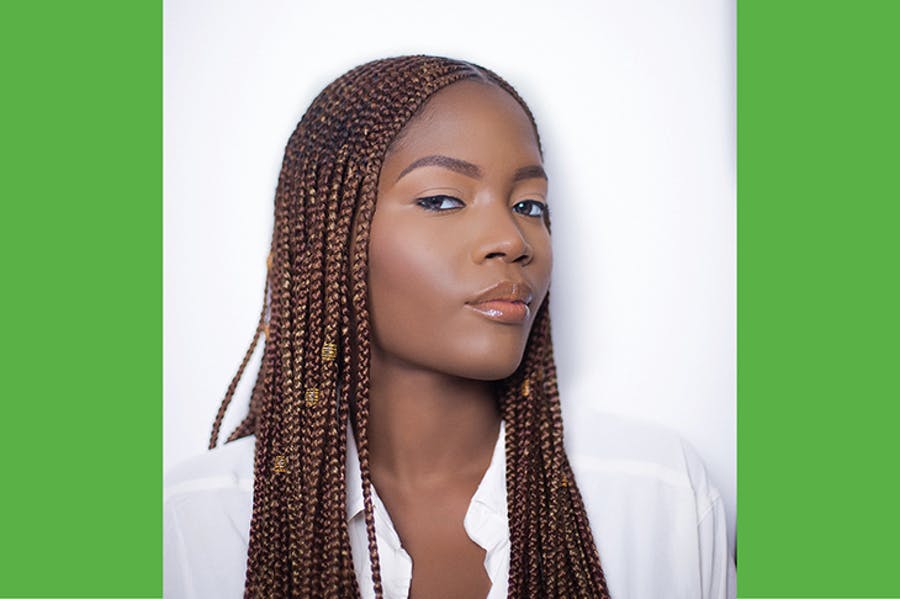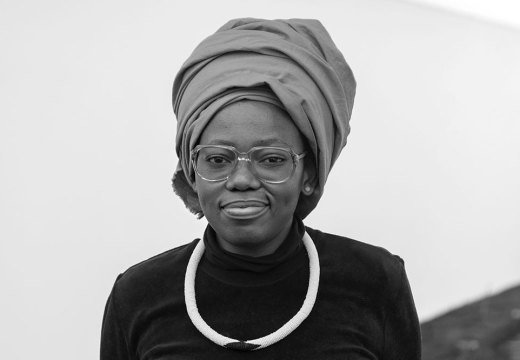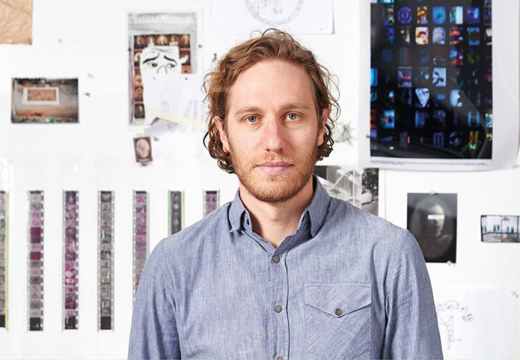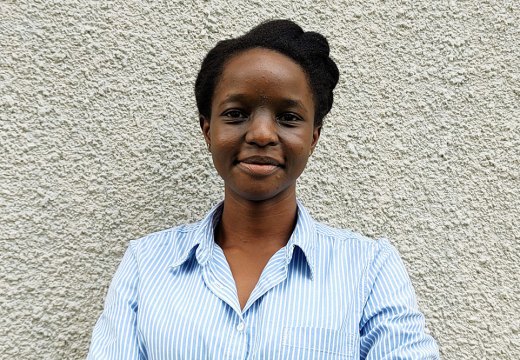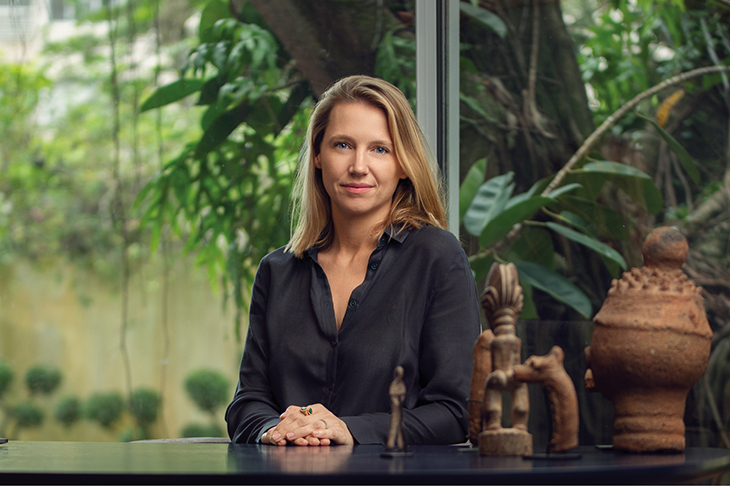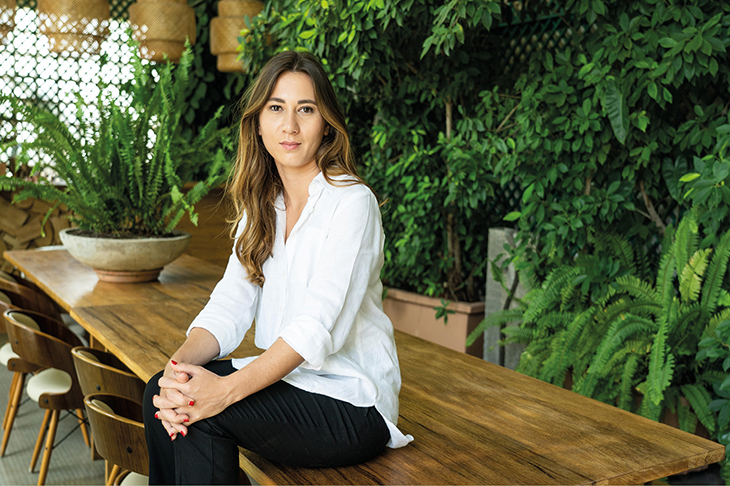Founding director, Rele Art Gallery and Rele Arts Foundation, Lagos and Los Angeles
Continuing our series of profiles of individuals selected for the Apollo 40 Under 40 Africa
This year you launched a new space for Rele Art Gallery in LA – in addition to your existing location in Lagos. Why Los Angeles?
Rele Art Gallery has always had an international outlook, and I’ve always loved LA as a city – I have always connected with how vibrant the art community is here and how diverse it is. When I think about New York, there are a lot of similarities [there] with Lagos, in terms of how chaotic and hectic and fast-paced it is. But in LA there’s less pressure – people are warm. We’ve had such a great reception in the two months that we’ve been here; other gallerists have been so welcoming and embracing. I see it as our gateway to the international art world.

Rele Art Gallery in Los Angeles
The title of the inaugural show, ‘Orita Meta’, translates roughly as a ‘junction where three roads meet’, and comes from a work by the artist Peju Alatise. How did the show explore this idea?
It was deliberate to show three female artists; we were conscious that this was going to coincide with Women’s History Month. But I also wanted to present stories that I thought the audience in LA might not be familiar with. Each of the three artists in that show – Marcellina Akpojotor, Tonia Nneji and Chidinma Nnoli – has a very clearly defined style, considering how young they are. But they’re each, in their own way, looking at the traumas of being a woman in Nigeria, and the efforts to gain freedom from a patriarchal society.
How did Rele Art Gallery first get started in Lagos?
Well, my own love for culture started at a very young age. I started doing pop-up exhibitions [in 2010], but this was always meant to lead to a more permanent base. I was interested in what the young artists were doing and giving young artists the platform and the opportunity to present themselves. I wanted to see myself in those artists and I wanted other people around me to do the same – we’re a very young population in Lagos. I was also looking for work that would really reflect the complexity of being a Nigerian, whether actually living in Nigeria or living abroad. Many young people have to wrestle with their identity – and being able to see art that reflects this struggle is, I think, really important. When I started, the art world in Lagos was dominated by much more traditional ways of looking at things.
A year after the gallery opened in 2015 we decided to create the [Rele Arts] Foundation – the not-for-profit aspect of what we do, where we train and nurture artists. The foundation puts together our annual Young Contemporaries Programme, which looks to provide the critical resources that artists need to navigate the art world. I think that more 100 artists have gone through the programme by now – I always say it’s the most important thing I do every year. And it’s evolved over the years. We now have other African countries from within the continent who take part.
In 2017 you curated Nigeria’s first-ever pavilion at the Venice Biennale, together with associate curator Emmanuel Iduma. What was it like to work on this project?
I’ve always wanted to help new audiences appreciate artwork from Nigeria. Nigeria has a very long history of arts and culture – everybody talks about the Benin Bronzes, which were taken from Nigeria in the late 19th century. But if you look at Venice, which is supposed to be the Olympics of the art world – it was actually quite disappointing to discover Nigeria had never been included. Still, it was really important for us to be represented: at the time, there were only seven African countries showing there.
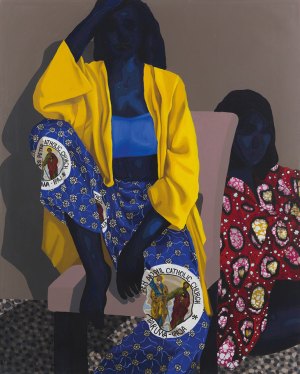
I Want to Tell You a Story (2020), Tonia Nneji, exhibited in ‘Orita Meta – Crossroads’ at Rele Art Gallery, Los Angeles, Feb–March 2021. Photo: Ian Byers-Gamber
We called the exhibition ‘How About Now’ – first of all to make the point that Nigeria’s pavilion at the biennale was long overdue. But we also showed three contemporary artists who presented works that spoke to the past, the present, and the future of the country. Victor Ehikhamenor, who is from Edo State, made a work called A Biography of the Forgotten – a remembrance of the bronze-casters of Igun Street in Benin City. Qudus Onikeku, a young performance artist, focused on the present; he put on a series of shows in the pavilion drawing on Yoruba tradition and contemporary dance. And then there was Peju Alatise, whose work was called Flying Girls. This installation spoke to deep-rooted issues we deal with as women in Nigeria, while also imagining a future in which young girls can fly and can be whatever they want. Bringing the three of them together was very powerful.
You’ve also served as a cultural consultant to the governor of Ogun State. How important is government support for the arts in Nigeria?
I always say that you have to have leaders in a position of power who understand the significance of these things. In Edo State there is now a dynamic governor, Godwin Obaseki – he was the commissioner of the Venice Biennale, and he’s been instrumental in advancing the repatriation of artefacts to Nigeria through working with the Benin Dialogue Group. There have been so many other opportunities for others to do what he’s doing now, but they didn’t. Having people like him in government – who just understand the importance of the arts – is something I really appreciate very much.
Do you think the return of Benin Bronzes to the new Edo Museum of West African Art will change the way that artists in Nigeria operate?
That’s exactly why I’m most excited about them coming home. Having artists from all over the country, not just from Edo State, appreciating and understanding that these great works were created by our forefathers… I don’t think we can really comprehend now what that could do for our artists.
Rele Art Gallery in Los Angeles is currently showing ‘Life after Life’, a solo exhibition of works by Ameh Egwuh. For more information visit the gallery’s website.
Unlimited access from just $16 every 3 months
Subscribe to get unlimited and exclusive access to the top art stories, interviews and exhibition reviews.

